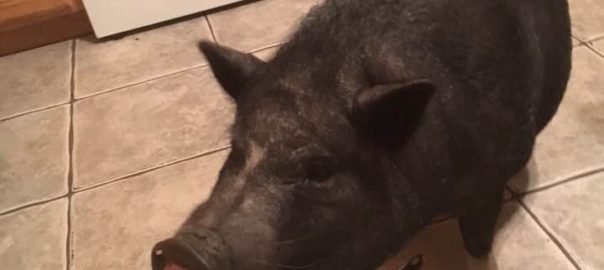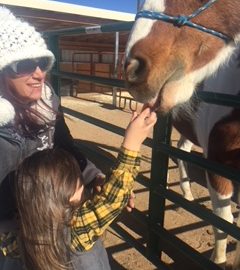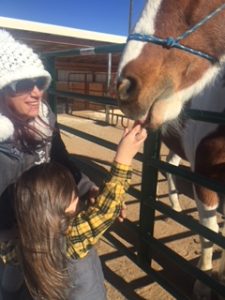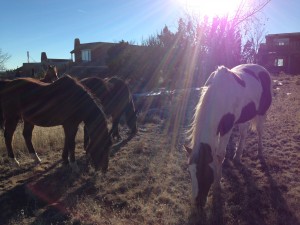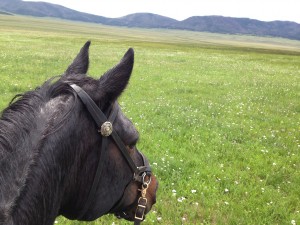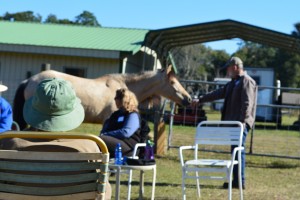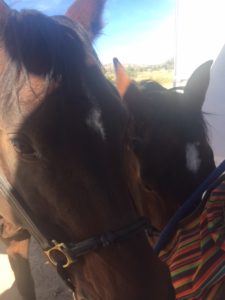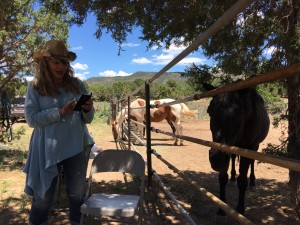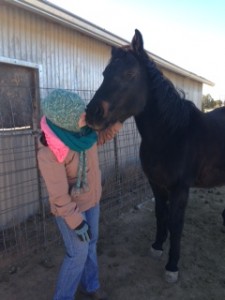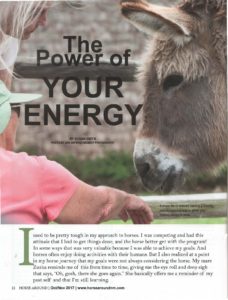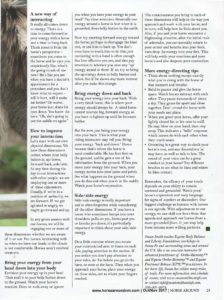Years ago, I was teachnig in Florida at my friend Anne’s ranch, and her young pig Rosie got into my luggage. She ate face cream, my snack bars, and other stuff from my open suitcase. I caught her at it, and promptly guided her out, walking behind her, as I would with a horse.
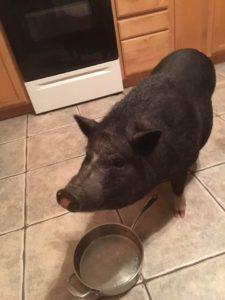
There was a a lot of squealing, turning to face me with upturned, indignant snout, but Rosie the Wrecking Ball did move off to other food sources.
At that time, I had not been around pigs much and had no idea if any of that liberty work would work on a pig, but it did. I think that was how she was trained from that day forward.
A friend who had grown up on a farm said if you could do Liberty Foundations with a chicken, then you could very easily do it with a horse. I’ve not had that experience, although a rooster did come to one of my workshops, tucked lovingly into the jacket of one of the attendees. We had so many horses to work with we didn’t have time to work with the rooster, but it’s on my bucket list!
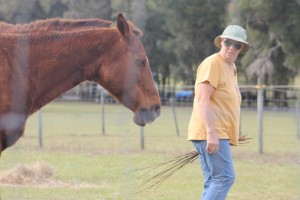
The point of all this is, we who practice Liberty Foundations or other alternative forms of horsemanship or training, are traveling a trail less traveled. If you can practice it with a chicken or a pig, you can do it with a horse. We are giving the horse an opportunity to choose. There are obviously times when we must ask the horse to do something they may not wish to do, like with Rosie, asking her to get out of my luggage. Or like our kids must brush their teeth, eat their vegetables, etc. but if they get a choice between certain things at some times, they feel their world open up. It also may be that brushing one’s teeth becomes less onerous because they know that they will get to do something fun afterwards. I used to take my kids to get ice cream after getting immunizations.
The ice cream is more of a reward system, but we have rewards built into liberty as well. Any approach where we are rewarding good behavior and not focusing on bad behavior will give great rewards in terms of connection, communication and lasting work together.
The trail less traveled may be filled with brambles. It may be a bushwhacking trail, where 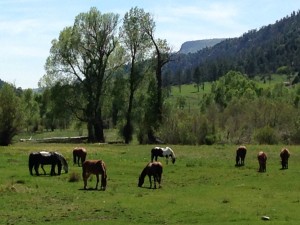 there isn’t a trail but in order not to fall off a cliff you are traversing the side of a mountain and carving out a path so you can ride down into a beautiful valley or other limitless vista. People who follow tried-and-true methods without exploring possible options won’t have this problem because their course is already set. They pick a place where there isn’t the possibility of lost trail, quicksand or other challenges. It’s challenging enough just to get the basics on the animal, let alone go off into the unknown.
there isn’t a trail but in order not to fall off a cliff you are traversing the side of a mountain and carving out a path so you can ride down into a beautiful valley or other limitless vista. People who follow tried-and-true methods without exploring possible options won’t have this problem because their course is already set. They pick a place where there isn’t the possibility of lost trail, quicksand or other challenges. It’s challenging enough just to get the basics on the animal, let alone go off into the unknown.
What if it’s like she said, the horse won’t respect me if I don’t get tough?
Well, I ask, what are your convictions? Do you feel okay about what’s happening or do you shrink from the tough work with your horse? Do you feel your point could be made with less force? Do you want an adversarial relationship with your horse because you can get the horse to submit that way?
My other question is, what is your energy like? Feel it in all its glorious dimensions. Is it forward, back, side-side, up-down, does it feel good in all those dimensions or is it missing out somewhere? Is it squishy or dark or inaccessible?
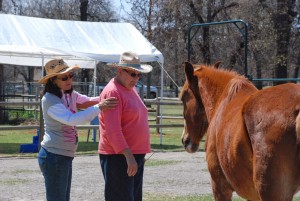
The horse will notice these things. The horse has a veritable PhD in energy. When people say you must work with intention, this energy and dimension stuff all fits into that one word. Your intention can be blocked by the energy in your dimensions without you knowing about it.
So it’s not just about the doing. It’s not about being so scary the horse absolutely has to do what you say. It’s how you are inside.
Many students become intimidated at this stage because they know the teacher has more knowledge than they do, so they better listen, even though their gut is twisting with angst. They feel their horse not want to be near them. While the horse does everything the student wants now, the student feels they have lost their horse.
Where is the fun-loving sweetness and eagerness? The student may try to win the horse back with lots of cookies or pets, but they are nervous and tipped over in the relationship now. Someone else is directing the flow even when the horse and owner are alone. Training by intimidation.
It’s difficult to hold onto your convictions if you know that someone knows more than you. But you have convictions. Think about other areas of your life where you feel very strongly about things: your chosen profession, animal rights, the environment, education, world peace, etc.
There is also the thing where the professional may say, well what you’re doing doesn’t work because you still haven’t accomplished what you set out to do.
My reply could be, yes, but I have a horse who has light in her eyes, who is still curious about our work together, who meets me at the gate. Whether we meet the goal is less important to me than the process.
In a way it’s like psychotherapy. When I was in therapy, the therapist would always say, it’s a process.
It’s a process, like health is also a process. When I work with horses and people, they become better hopefully, and sometimes they have setbacks or get injured and I see them more often. Sometimes I work with them near death. That’s life.
If I lose my horse’s trust, which has happened to me, I worry that I may not regain it. I have breached a confidence, some understanding we share. I have the greater intellect, so I am responsible for not abusing that. The horse has the greater primal intellect; he knows how to live in nature and by primal rules. His responsibility is to not take advantage of his position also, but may need to learn that in relationship with humans. This is where we offer guidance.
If I demonstrate enough trustworthy behavior I can generally regain the confidence and trust of my horse, unless the horse has been abused a great deal before I came along. But at that point I must continue to offer a good deal, and if I have to ask more of my horse than he wants to do, I reward him greatly for his supreme efforts.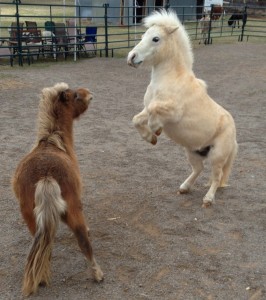
This is the trade-off, this is what makes the trail less traveled different.
The trail less traveled may involve a technique you come up with on-the-fly, that’s not in the handbook, something you have learned by watching your horse. This is wonderful, you are moving into intuitive learning, intuitive training, without steps. Sometimes we need steps like we need a map when we’re unsure of where we’re going, at the beginning.
But after awhile, the concepts become embodied and it is easier. Your convictions become stronger. The voices of the critical world fall away. You are moving along the trail, your horse picking her footing, dropping down off the mountain, heading into switchbacks with sunlight blinding you, skirting deadfall, down into that gorgeous valley where tall grasses tickle your mare’s knees and a thin snow-fed stream gurgles through. You are as one. And nobody can tell you any different.



